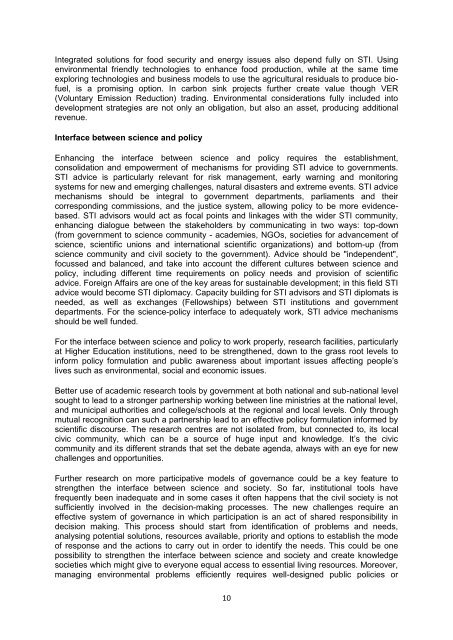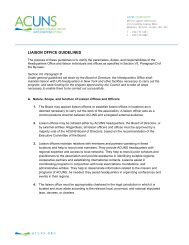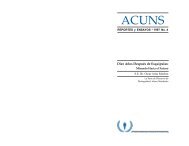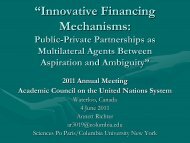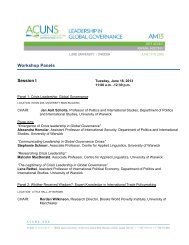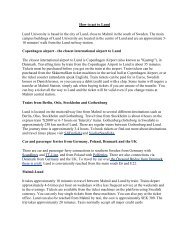E-discussion: Building the future we want with science ... - Unesco
E-discussion: Building the future we want with science ... - Unesco
E-discussion: Building the future we want with science ... - Unesco
You also want an ePaper? Increase the reach of your titles
YUMPU automatically turns print PDFs into web optimized ePapers that Google loves.
Integrated solutions for food security and energy issues also depend fully on STI. Using<br />
environmental friendly technologies to enhance food production, while at <strong>the</strong> same time<br />
exploring technologies and business models to use <strong>the</strong> agricultural residuals to produce biofuel,<br />
is a promising option. In carbon sink projects fur<strong>the</strong>r create value though VER<br />
(Voluntary Emission Reduction) trading. Environmental considerations fully included into<br />
development strategies are not only an obligation, but also an asset, producing additional<br />
revenue.<br />
Interface bet<strong>we</strong>en <strong>science</strong> and policy<br />
Enhancing <strong>the</strong> interface bet<strong>we</strong>en <strong>science</strong> and policy requires <strong>the</strong> establishment,<br />
consolidation and empo<strong>we</strong>rment of mechanisms for providing STI advice to governments.<br />
STI advice is particularly relevant for risk management, early warning and monitoring<br />
systems for new and emerging challenges, natural disasters and extreme events. STI advice<br />
mechanisms should be integral to government departments, parliaments and <strong>the</strong>ir<br />
corresponding commissions, and <strong>the</strong> justice system, allowing policy to be more evidencebased.<br />
STI advisors would act as focal points and linkages <strong>with</strong> <strong>the</strong> wider STI community,<br />
enhancing dialogue bet<strong>we</strong>en <strong>the</strong> stakeholders by communicating in two ways: top-down<br />
(from government to <strong>science</strong> community - academies, NGOs, societies for advancement of<br />
<strong>science</strong>, scientific unions and international scientific organizations) and bottom-up (from<br />
<strong>science</strong> community and civil society to <strong>the</strong> government). Advice should be "independent",<br />
focussed and balanced, and take into account <strong>the</strong> different cultures bet<strong>we</strong>en <strong>science</strong> and<br />
policy, including different time requirements on policy needs and provision of scientific<br />
advice. Foreign Affairs are one of <strong>the</strong> key areas for sustainable development; in this field STI<br />
advice would become STI diplomacy. Capacity building for STI advisors and STI diplomats is<br />
needed, as <strong>we</strong>ll as exchanges (Fellowships) bet<strong>we</strong>en STI institutions and government<br />
departments. For <strong>the</strong> <strong>science</strong>-policy interface to adequately work, STI advice mechanisms<br />
should be <strong>we</strong>ll funded.<br />
For <strong>the</strong> interface bet<strong>we</strong>en <strong>science</strong> and policy to work properly, research facilities, particularly<br />
at Higher Education institutions, need to be streng<strong>the</strong>ned, down to <strong>the</strong> grass root levels to<br />
inform policy formulation and public awareness about important issues affecting people’s<br />
lives such as environmental, social and economic issues.<br />
Better use of academic research tools by government at both national and sub-national level<br />
sought to lead to a stronger partnership working bet<strong>we</strong>en line ministries at <strong>the</strong> national level,<br />
and municipal authorities and college/schools at <strong>the</strong> regional and local levels. Only through<br />
mutual recognition can such a partnership lead to an effective policy formulation informed by<br />
scientific discourse. The research centres are not isolated from, but connected to, its local<br />
civic community, which can be a source of huge input and knowledge. It’s <strong>the</strong> civic<br />
community and its different strands that set <strong>the</strong> debate agenda, always <strong>with</strong> an eye for new<br />
challenges and opportunities.<br />
Fur<strong>the</strong>r research on more participative models of governance could be a key feature to<br />
streng<strong>the</strong>n <strong>the</strong> interface bet<strong>we</strong>en <strong>science</strong> and society. So far, institutional tools have<br />
frequently been inadequate and in some cases it often happens that <strong>the</strong> civil society is not<br />
sufficiently involved in <strong>the</strong> decision-making processes. The new challenges require an<br />
effective system of governance in which participation is an act of shared responsibility in<br />
decision making. This process should start from identification of problems and needs,<br />
analysing potential solutions, resources available, priority and options to establish <strong>the</strong> mode<br />
of response and <strong>the</strong> actions to carry out in order to identify <strong>the</strong> needs. This could be one<br />
possibility to streng<strong>the</strong>n <strong>the</strong> interface bet<strong>we</strong>en <strong>science</strong> and society and create knowledge<br />
societies which might give to everyone equal access to essential living resources. Moreover,<br />
managing environmental problems efficiently requires <strong>we</strong>ll-designed public policies or<br />
10


